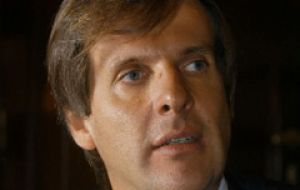MercoPress. South Atlantic News Agency
Argentine financial markets waiting for outcome of Central Bank dispute
 “Coming to Congress is complying with a republican act”, said Redrado
“Coming to Congress is complying with a republican act”, said Redrado Argentine financial markets closed lower on Wednesday waiting for the outcome of the ongoing dispute between President Cristina Kirchner and Central bank governor Martin Redrado which is now under consideration in Congress.
A special congressional commission is debating Mrs. Kirchner’s decision to fire Redrado for blocking her order to use 6.6 billion US dollars in foreign currency reserves to repay debt.
After four hours of justifying his decision of not quitting his position as chief of the Central Bank, Redrado concluded his participation at the Bicameral Committee's special session to debate his removal. He is to meet the advisory body again tomorrow.
Earlier in the afternoon in the midst of a tumultuous arrival at the Argentine Congress, Redrado declared: “From now on, each time the possibility of removing a Central Bank chief appears, the Executive branch will have to resort to the Congress' intervention”.
The congressional commission -composed of Kirchnerite lawmaker Gustavo Marconato, who was re-elected as the president of the Budget and Treasury Committee of the Lower House of Congress, and opposition Civic Coalition lawmaker Alfonso Prat Gay (head of the Finance Committee) also summoned Central Bank Deputy Governor Miguel Pesce, and Treasury Prosecutor Osvaldo César Guglielmino.
Redrado explained: “Coming up here to the Congress is complying with a republican act.” He entered the institution followed by his attorneys.
On Tuesday the ousted head of the Central Bank had demanded President Cristina Kirchner revoke the DNU emergency decree which she had issued in order to dismiss him from his post as the Central Bank governor. He had imposed this as a condition for him to participate in the advisory body's special session.
“I request this Bicameral Committee to ask the Executive branch to revoke the DNU emergency decree N° 18/2010 as a previous step for my declaration before this Committee in a special session, so I am able to defend myself and my rights as the Central Bank's chief,” Redrado pointed out in a letter sent to the advisory body.
On Wednesday the benchmark MerVal stocks index fell 0.13% to 2,306.21 for a sixth straight loss. The risk spread on Argentine bonds widened by 7 basis points to 746 basis points over comparable US Treasuries, according to the benchmark J.P. Morgan Emerging Market Bond Index.
On the foreign exchange market, the peso closed down 0.32 percent to its lowest level since June 2009 ending at 3.8950/3.90 per U.S. dollar.
As a result of the dispute Argentine international reserves remain frozen at the Central Bank due to a court order blocking the transfer until Congress can vote on the issue. There's considerable uncertainty surrounding how the new, opposition-dominated Congress will vote.




Top Comments
Disclaimer & comment rulesCommenting for this story is now closed.
If you have a Facebook account, become a fan and comment on our Facebook Page!